- Home
- Gregory Maguire
The Next Queen of Heaven Page 7
The Next Queen of Heaven Read online
Page 7
“Don’t you need a special license to drive a motorcycle?”
“Jeremy. Come on. No highway trooper in upstate New York is going to ask to see a nun’s driver’s license.”
He didn’t know if she was joking or not, but a bike waited in the parking lot, next to the St. Vincent de Paul Society drop-off bin. “Want to take a spin around the block?”
“No. No thanks.”
She looked at him with a shake of her head. “You know, I hate to fall back on stereotypes, Jeremy, but isn’t a handsome young buck like you supposed to have a more heightened sense of adventure than a middle-aged nun? You should get out more.”
He thought she’d stepped across the line. He tried for a neutral tone, maybe mocking, maybe aggressive: “You want to get me a hooker? Or some Ecstasy? Or a new job that actually pays real money?”
She wasn’t one to back down. “A new boyfriend, maybe. Someone who could make you a little cheerier. Don’t look so shocked. I told you I know depression when I see it. Here, would you pin my veil to my backpack? It tends to whip about.” She handed him an old Clinton/Gore button and turned her back to him.
“Are you allowed to do political advertising? Aren’t you avowedly neutral according to the tax code?”
“If they can catch up with me, they can sue me. Hey, Jeremy, think about what I said.”
“About the convent?”
She was revving the motor. She mouthed “Think about it,” and gave a thumbs-up as she pulled the visor down.
9
HAVING FINISHED MARKING the sockets of empty egg cartons with digits, one through six, so his preschoolers could wrestle with the concept of one-to-one correspondence, Jeremy was tucking them in a grocery bag for school tomorrow when he saw Babs pull up at the curb. The parking was diagonal here to accommodate patrons of Getchen’s Market downstairs, so Jeremy had a cameraman’s angle above Sean as he emerged from the passenger’s seat. What a gauntness in Sean these days. A paperiness not always obvious face on. Still, by habit perhaps, Sean tucked his shirt in and then puffed it out a little over the belt in the back, that useful practice to make the waist look thinner so the bum was more shapely.
If Sean’s waist gets any thinner, though, thought Jeremy, he’s going to be a walking emblem of eternity—that mathematical symbol called the lazy eight, the bow-tie loop that crosses in the middle and returns the way it came, all the while lying on its side like road kill.
More to the point, even at this stage in his illness Sean is still angling for me, or at any rate he hasn’t gotten out of the habit of trying.
Problematic though that was for Jeremy, he had to concede that by focusing such keen attention to old habits did Sean keep himself together.
While for me? Old habits are my death trap.
Another conundrum. Still, despite the mixed signals it might give, he found himself straightening his own clothes. Old habits do die hard. He went to open the stair door.
Mounting the outside steps, Sean and Marty were still nattering about, it seemed, some hunky Central American kid newly staffing the produce aisle of the Price Chopper. Sean was narrating and Marty salivating. “But you’ll never guess what his name was,” said Sean.
“Pablo? Pedro? I know: Emmanuel.”
“God with us,” sang Sean, from Messiah. “I wish. No. Hector. Who names an Ecuadoran kid Hector?”
Jeremy beamed, feeling a false sort of liveliness on his face. “Fresh love. Come in, tell all.” Oh, that someone might step in and displace himself in Sean’s affections.
Sean handed Jeremy a six-pack. “Sadly, more fresh than love. I fluttered around the vegetable bin, pretending clumsiness, asking for help at dropping spinach leaves into my plastic bag. I didn’t even have to pretend I was shaking; I was shaking. His forearms seizing out from under his rolled-up dirty white grocer’s jacket, two sizes too big for him—they were parsnip-brown and smelled like garden soil. I wanted to push him backward into the greens bin and make a mixed salad of him, to go.”
Marty whistled. “Ravishment in the radishes. Wish I’d been there.”
“A little olive oil applied judiciously does wonders.”
“Myself, I prefer a creamy Italian. The creamier the—”
“Stop.” Jeremy, ever the killjoy. But this time for good reason, to keep Sean on the subject of real life, not this capering into whispery fantasies that dulled the senses—as he well knew. “You’ve a live prospect then. Get his phone number?”
“Hardly.” Sean busied himself with his fingernails. “Believe me, I batted my eyelashes till they were flaking off into the spinach. But his face had that hollow look, as if there was something gone … you know that look. The inward focus. Distantly attentive to the home you’re missing, or the someone you’re missing. Somewhere in Central America, probably. That look that a bird has when it turns its dry reptilian eye on you. That look that doesn’t see you, because the mind is filled up with someone it would rather see.”
“Loneliness.” Jeremy felt like a walking book of adages culled from the Farmer’s Almanac. “The perfect precondition for a new romance—”
Sean raised his eyebrows. “Peddling false hope is not only cowardly, but vicious. Besides, I’m waiting for you to wake up and notice I’m here in your apartment. Wearing a fabulous shirt, by the way.”
“Yeah, suits you.”
“I put it on for Hector but he doesn’t know I exist. So you might as well.”
“Down to business,” said Jeremy, and they collapsed onto what passed for furniture, some old nylon-webbed lawn chairs that his father had intended to drag to the dump. Jeremy started to explain the situation proposed by Sister Alice Coyne, but only got a few sentences out before Sean interrupted.
“Absolutely not. I’d rather kill myself.”
“It’s not such a bad idea,” said Jeremy. “I mean, who would know, for one thing? These aren’t even local nuns, they’re all transplanted here to retire. They don’t get out. Who’s going to tell your parents? Sean, get over yourself.” As if he were one to talk.
“The smell of ripe baloney is stronger today than usual. Does it come in a can so you can touch up the soiled atmosphere?” Marty as usual trying to broker a truce.
“Let’s stick this subject out,” said Jeremy. “We don’t have all day.”
“I’m not doing it,” said Sean. “Don’t waste your breath.”
“Sean, how can you turn your back on the Church and still be so scared of some dumb old nuns?” said Marty.
“You didn’t go to Catholic school. Recovery is not an option.”
“So I hear, but these nuns didn’t inflict any damage on you. For one thing, they’re too old to have taught you.”
“Hah!” Sean pretended to hawk and spit. “There’s no such thing as a too-old nun. They’re like the Pope. The older they get, the more infallible. Anyway, they might not have ruined my life, but they did their dirty business to other poor souls. When does the statute of limitations run out on psychotic abusive grade school nuns?”
“It’s not as if we have other choices,” said Jeremy.
“Look. Our Lady’s gives you a paycheck, and so you feel obligated to comfort the enemy. That’s your weirdness. That doesn’t mean we have to. If the Church hadn’t so roundly announced that we were in a state of mortal sin these last, oh, two thousand years or so, we wouldn’t be in the mess we’re in.”
“The mess of needing a rehearsal space?” asked Jeremy.
“Western governments emerged out of the ashes of the collapsed Church oligarchy and they appropriated the same oppressive cultural norms. Still no women priests in the Catholic Church, Jeremy, or haven’t you noticed? Fags still have to ride in the third-class car if they want to get on the Gospel Train. I know: God loves us and will forgive us our sins so long as we don’t sin in any really interesting way. Don’t get me started. It’s a no go, Jeremy.”
“You’re talking about your parents, I think.”
“And so what if I am? Wh
ere do you think they got it from? Fucked up as they are, I don’t blame them for inventing churchy shit, just for swallowing it. Let others be bad that we, O Lord—that’s Deirdre and Paddy Riley, R-I-L-E-Y—might be good. I hate the whole stupid thing. If I didn’t have the hots for you, Jeremy, I’d be walking out of here in a snit.” He arched his feet in Jeremy’s direction and opened his legs.
Jeremy looked the other way. “Marty? The voice of Jewish reason here?”
“On the one hand, he has a point,” said Marty. “The norm that says it’s okay to kill Matthew Shepard is constantly endorsed and reinforced by good people keeping silent. Hey, did you hear the second attacker got convicted today?”
“Good news like that still doesn’t have the capacity to make anyone happy,” said Sean. “Or maybe I’ve just forgotten what happiness is.”
“Playing devil’s advocate, then, I also say: How bad could it be?” continued Marty. “I mean, we go in there and do our work, we say hi to the old penguins for ten minutes. Big deal. Do we have much choice?”
“I’m not chatting up any old nun,” said Sean, “who is breathing down her desiccated sinuses in disapproval of me.”
“What if you brought the choir out there to rehearse?” asked Marty. “Then we could use the parish house meeting room freed up on Thursday nights.”
“I already thought of that. Peggy Mueller can’t change her night. Leonard’s bowling night is Thursday, so that’s the only night she gets to go out. Come on, guys, a little flexibility here. I’m trying to work this out for all of us.”
“Well,” said Marty, “I’m game. I’m immune to nuns. I’ll smear myself with cream cheese and lox and rub gefilte fish into my hair. We’re only talking a ten-week commitment. The time it takes to argue about it we could be rehearsing, you know.”
Jeremy released some beers from the cardboard sleeve and held them out, a kind of peace offering. “Unless we get a place to practice, there’s no point carrying on. We can’t tiptoe into the Manhattan big time without shaping up our act. I won’t do it. It’s not just that my career might be on the line: it’s that I will be petrified and not able to open my mouth.”
Sean put his hands over his eyes. “Does this constitute an artistic tantrum? At least be honest about that. You don’t have a career yet, Jeremy, unless you think singing in church qualifies. If I’m going to go along with this, let’s be clear about why. No false pretenses.”
Was Sean ready to admit Jeremy and Marty were doing this partly for him: to keep him going, keep him singing while he could still sing, keep him thinking forward—into the next century, and as beyond into it as he could imagine? Jeremy summoned up a high-toned look of umbrage he hardly felt. “It is my career. You think I work so hard on my music for—”
“It’s not your career on the line.” Sean leaned one elbow on the aluminum arm of the chair till it squeaked. “You want to get out of Thebes and escape your glamorous bête noire, and since they don’t take fags in the Foreign Legion, this is the only thing that you can think of. Fair enough. Okay, you win. I’ll help you on this, even though I can tell your little trial shot in New York City is an exercise to escape from the toxic radiation of your college heartthrob. You think I can’t tell that? I should have my head examined to be helping.”
“You’ll come too,” said Jeremy. “The symposium is only a weekend, for crying out loud.”
“Give it a rest, and stop looking so self-righteous at me. It’s not your career on the line, Jeremy. It’s your heart on the line. If you’re going to drag me into that nunnery warehouse, at least be an honest man about it.”
Sean shook the can of beer just a little and set it on his zipper, and flipped the pull tab. The golden spume rose six inches and fizzed on his lap. “You wish I didn’t know you so well,” said Sean, “don’t you. You wish you hadn’t told me so much.” Then, in a nicer voice, “Here, have a brew. No strings attached.”
10
IN AN EXCESS of nervous energy Tabitha had gotten out some of the Christmas ornaments and hung them up on the hooks in the bay window that used to hold planters before all the plants crisped and flaked to death. A little fringe of hard plastic angels with vacant expressions, twisting in the currents from the floor heaters. She hoped they might make her mother happy, but in fact only the new cat seemed to notice. Meanwhile Tabitha and her mother, and for that matter Hogan and Kirk, seemed all twisted themselves, unsettled and airborne and unfocussed, each in a different way. A change of situation like this was hard to negotiate.
As far as Tabitha could tell, for the first couple of days at home, Mrs. Leontina Scales did nothing but finger the pages of the Bible. She didn’t seem to be reading it, exactly; she felt the margins and ran her hands over the columns of type as if admiring the weave and nubble of a nice piece of cloth. She would take cups of black tea and a slice of toast every now and then. But Tabitha could rarely get her to engage in conversation.
Tabitha played Christmas music on the CD player until Mrs. Scales said, “Leap in heavenly peace, my ass,” and snapped the CD in the garbage disposal and turned it on. Tabitha had to admire her gumption. If only her mother could learn to use her lunatic superpowers for goodness.
On Monday morning Mr. Reeves called and asked to speak to Mrs. Scales. “She can’t come to the phone right now,” said Tabitha. “I’ll take a message.”
“I’ve called and left three messages,” said Mr. Reeves. “You’re not giving them to her.”
“Says who? I am too. I can’t make her call you back if she doesn’t want to.” The phrase came to her too fast to hold it back. “Am I my mother’s keeper?”
“Well.” An intake of breath from the principal. “That’s a good question. I am giving you the benefit of the doubt and assuming your absence from school is because of your mother’s accident. But I better not find out you’re milking this, Tabitha.”
“Don’t worry. You won’t.”
“If you can’t bring your mother to the phone I’m going to have to stop by, or get Social Services involved.”
“She’s deep in prayer, but when she comes up to room temperature again I’ll tell her you called.”
“I need to know how to reach your father, Tabitha. The forms we have on file here don’t give a current phone number—”
“Oh my mistake she’s on the toilet and needs a little attention. She’ll call you back, Mr. Reeves. Promise.” Tabitha hung up so hard the mute plastic angels swayed in consternation.
I hate this prison. Where is Caleb hanging out these days? Why doesn’t he answer my messages? How dare he abandon me when my mom is on the fritz?
Tabitha had gotten tired of driving by the trailer Caleb shared with his older brother. There’d been no lights on for a week. She didn’t dare ask Hogan to keep an eye out for him, because Hogan could take a request like that too far and she didn’t want Caleb to get hurt. And she had all too few girlfriends from school left, not after making cozy with their personal jackhammers. Her only confidant was Linda Pearl at the beauty salon. So she’d have to set Linda Pearl on the job of sleuthing out the dirt about Caleb.
The principal’s remark about her father brought back a conversation with Caleb Briggs a month ago or so. Generally Tabitha wasn’t the reflective sort, so she didn’t step outside her own skin to look back in. But Caleb had asked a question about Mrs. Scales, and Tabitha had found herself foaming to pin down for him the contradictions about her mother.
Mrs. Scales. Admired for a lot of good reasons. A pillar of the community, salt of the earth, steady as the Rock of Jehovah or whatever that insurance company was. Yet she had been married three times. Tabitha, Hogan, and Kirk had sprung from different dads. So as far as Tabitha was concerned, her own adventures in the vans and backseats and pool rooms (and once even in her cell at the jail) were in line with the standards of the Scales family.
No, she hadn’t ever wanted to talk to her mother about men. Tabitha had prepared a rejoinder in case her mom ever got on her case about
it. If you know so much, Tabitha would bark, how come you botched up three marriages in a row? Where’s your next husband coming from? And don’t you get any big ideas, she had joked to Caleb Briggs, who had kissed her dirty and changed the subject.
Later, lingering, unwilling to let him off and away on his bike too soon, she’d continued rehashing the family bio. The first husband was the Scales, and the Scales name had dribbled down over Tabitha’s half brothers even though they weren’t his kids. Casey Scales, purveyor of flooring materials. Ya gotcher linoleum, your Congoleum, your rush matting, your simulated pine planking in three-and-a-half and five-inch widths. You name it.
Casey Scales had come home from Vietnam and found Leontina Prelutski where he had left her, behind the goldfish counter at Woolworth’s, back when Thebes still had a Woolworth’s (now it was the Budget Five and Dime). Scales had thought Tina Prelutski was still there because she was faithful. More likely she’d been batting her eyes at every connoisseur of goldfish to come along, but since goldfish customers tended to be boys under the age often she hadn’t gotten very far.
The wedding pictures, in Tabitha’s humble opinion, were vomitrocious. In his tuxedo with a lime-green ruffled shirt her father looked like a percussionist escaped from the Lawrence Welk Show. And Tina Prelutski had been photographed tipped into a wedding dress designed for someone willowy. Leontina was more like a box hedge than a willow. You could see a tummy bulge that even studio lighting couldn’t erase. She must have been lowered feet-first into that dress by a crane. And Farrah Fawcett-Majors’s hair. What was everyone thinking of in those days?
The mothers-in-law, Mrs. Prelutski and Mrs. Scales, two attendants who looked like Soviet aerospace mathematicians, stood grimly on the side, flabby arms folded. Twin widows old enough to guess, accurately, that no good would come of this union. And along comes Tabitha to prove their point.
Describing her two grandmothers, now decently dead where they belonged, she’d laughed and laughed, but Caleb had not found her as amusing as she intended. He had disentangled himself and wiped up the beaded spill on his thigh and gone off to do something else he had to do. She had tidied up the trailer when he was gone, and in an excess of trust and confidence she hadn’t even thrown out the well-thumbed dirty magazines she’d found under his mattress. And except for the night in the Nixon mask, that was the last she’d seen of him.

 Missing Sisters
Missing Sisters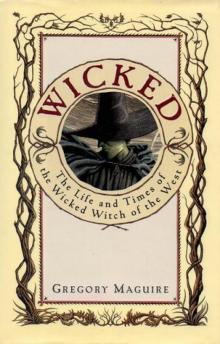 Wicked: The Life and Times of the Wicked Witch of the West
Wicked: The Life and Times of the Wicked Witch of the West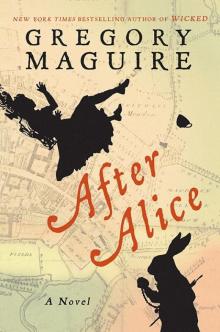 After Alice
After Alice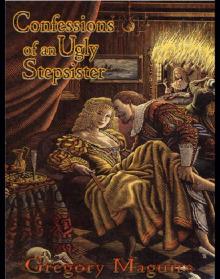 Confessions of an Ugly Stepsister
Confessions of an Ugly Stepsister Son of a Witch
Son of a Witch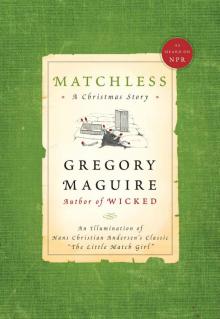 Matchless
Matchless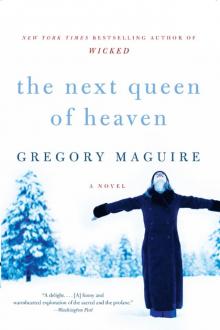 The Next Queen of Heaven
The Next Queen of Heaven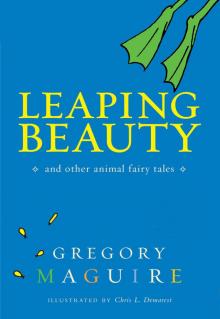 Leaping Beauty: And Other Animal Fairy Tales
Leaping Beauty: And Other Animal Fairy Tales Hiddensee: A Tale of the Once and Future Nutcracker
Hiddensee: A Tale of the Once and Future Nutcracker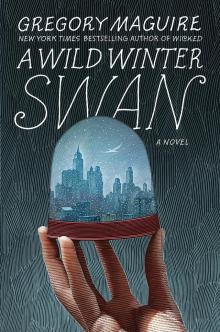 A Wild Winter Swan
A Wild Winter Swan Egg & Spoon
Egg & Spoon Out of Oz
Out of Oz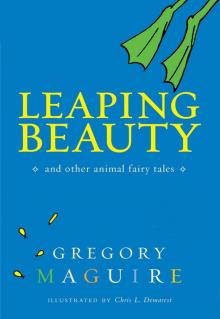 Leaping Beauty
Leaping Beauty Hiddensee
Hiddensee The Wicked Years Complete Collection
The Wicked Years Complete Collection The Next Queen of Heaven: A Novel
The Next Queen of Heaven: A Novel